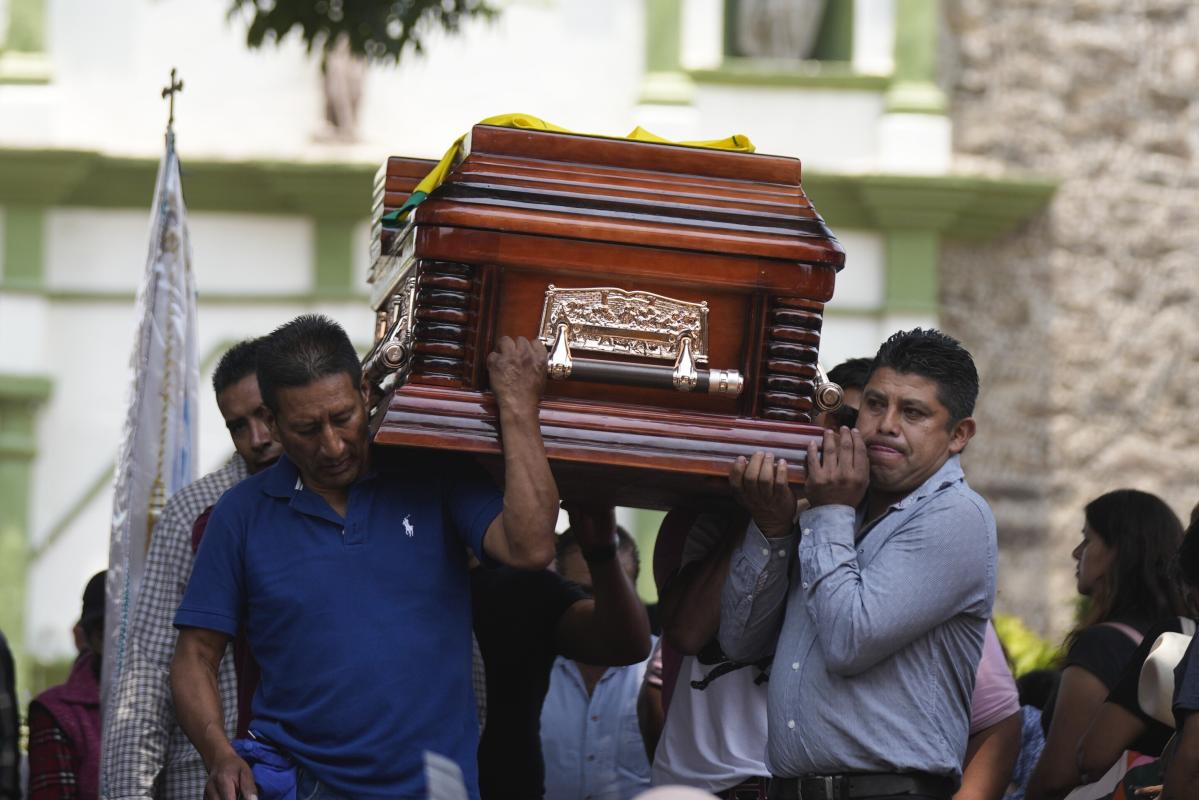COTIJA, Mexico (AP) — Mexico’s drug cartels and gangs appear to be playing a broader role in Sunday’s elections that will determine the presidency, nine governorships and about 19,000 mayors and other local posts.
The country’s powerful drug cartels have long carried out targeted assassinations of mayors and other local candidates who threaten their control. Gangs in Mexico depend on controlling local police chiefs and seizing part of municipal budgets; national politics seems to interest them less.
But in the run-up to Sunday’s election, mobs have increasingly turned to spraying entire campaign rallies with gunfire, burning ballots or preventing the establishment of polling stations — and even hanging banners to influence voters.
Security analyst David Saucedo says it is likely that some drug gangs will try to force voters to choose their favorite candidates.
“It is reasonable to assume that the cartels will mobilize their supporters during Sunday’s elections,” Saucedo said. “They have loyal voters who they have won through the distribution of food parcels, cash, medicines and infrastructure projects. They will use them to support narco candidates.”
In some places, the gangs appear to be encouraging people to vote, while discouraging voting in areas controlled by their rivals.
On Friday, election authorities said attackers set fire to a house where ballots were stored ahead of Sunday in the violence-wracked city of Chicomuselo, in the southern state of Chiapas. Although they did not say who was behind the attack, the city is completely dominated by two warring drug cartels, Jalisco and Sinaloa.
On May 14, gunmen apparently linked to a cartel shot and killed eleven people in one day in Chicomuselo. On May 17, five people were killed along with a mayoral candidate when gunmen opened fire on a crowd in the town of La Concordia, Chiapas, about 75 kilometers east of Chicomuselo.
Targeted killings of local candidates continued. Dramatic video footage showed a mayoral candidate in the southern state of Guerrero being shot in the head with a gun out of pure anger on Wednesday.
And mass attacks on campaign rallies, once exceedingly rare in Mexico, are becoming increasingly common.
Also on Wednesday, the last official day of the campaign, unidentified gunmen opened fire a few blocks away from a mayoral candidate’s final campaign rally in the western state of Michoacan, sending hundreds of people scrambling for safety.
“It seemed like a normal evening, just like the campaign closing events of other candidates,” said Angélica Chávez, a housewife who was at the rally in Cotija. “Then there were gunshots, several gunshots at very close range. And then people started running and diving to the ground, crouching.”
Chávez was injured during the stampede and had to take refuge in a local church.
In Celaya, a city in Guanajuato, gunmen opened fire during a campaign event in April, killing a mayoral candidate and wounding three of her supporters.
Saucedo, the analyst, sees the shootings as a sign that narco gangs are no longer willing to see their hand-picked candidates lose.
“Rather than allow the victory of a candidate who is not aligned with their criminal interests, or allow a candidate connected to a rival drug gang to win, they use this tactic,” Saucedo said. “What we see in the latest stretch is a pretty desperate strategy by some groups of drug traffickers.”
Saucedo said such attempts at narco-control of local politics had been seen before in some particularly violent states, such as Tamaulipas. “What was once limited… is now expanding to the entire country,” he said.
The National Electoral Institute says it has had to cancel plans for 170 polling stations, mainly in Chiapas and Michoacan and mainly due to security concerns. In Chiapas, election authorities say there are places they can’t even go.
In the northern border city of Nuevo Laredo, a shadowy group that local media say is linked to the northeast’s dominant drug cartel has put up posters claiming that one mayoral candidate has ties to the rival Gulf drug cartel.
Authorities have not confirmed the origin of the crude poster, which shows a Photoshopped image of the candidate brandishing an assault rifle and wearing a bulletproof vest with the Gulf Cartel insignia.
In the state of Morelos, just south of Mexico City, residents woke up this week to find a banner above a road saying a gubernatorial candidate had ties to rival drug gangs. The banner was signed by a local drug boss whose name is unknown: ‘the Commander of the Three Letters’.
Another apparently gang-related banner threatened that anyone trying to buy votes would be “severely punished.” That banner was signed by “Those who have always been in charge here.”
Such events seem to indicate that the cartels’ previous calculations — take out the strongest candidate you don’t like, and the remaining major party candidate will win by default — have become more complicated.
In a city in Michoacan, Maravaio, the gangs tried to remove all doubts about who would win this year and killed three mayoral candidates who did not suit their taste.
___
Sánchez reported from Mexico City. Associated Press writers Mark Stevenson in Mexico City and Edgar H. Clemente in Tapachula, Mexico, contributed to this report.






